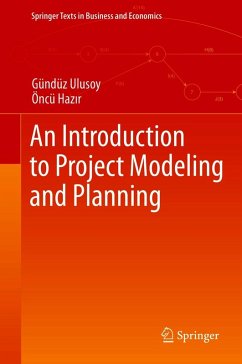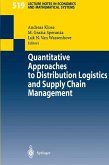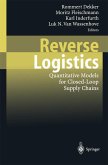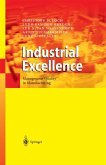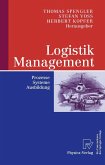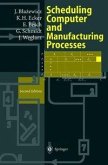This textbook teaches the basic concepts and methods of project management, but also explains how to convert it to useful results in practice. Project management offers a promising working area for theoretical and practical applications, and developing software and decision support systems (DSS). This book specifically focuses on project planning and control, with an emphasis on mathematical modeling. Models and algorithms establish a good starting point for students to study the relevant literature and support pursuing academic work in related fields. The book provides an introduction to theoretical concepts, and it also provides detailed explanations, application examples and case studies that deal with real life problems. The chapter topics include questions that underlie critical thinking, interpretation, analytics, and making comparisons. Learning outcomes are defined and the content of the book is structured in accordance with these goals.
Chapter 1 begins by introducing the basic concepts, methods and processes of project management. Chapter 2 explores the fundamentals of organizing and managing projects from an organization's perspective. Issues related to project team formation, role of project managers, and matrix organization are discussed. Chapter 3 is devoted to project modeling and planning. It explains how to collect proper data in order to perform an analysis and develop mathematical models. Chapter 4 introduces deterministic scheduling models, which can be used in constructing the time schedules. Models employing time-based and finance-based objectives are introduced. Chapter 5 focuses on the time/cost trade-off problem, explaining how to reduce the duration of some of the activities and therefore accelerate the project duration at the expense of additional costs. Chapter 6 introduces different resource management policies including resource portfolio management. Chapter 7 discusses models and methods of scheduling in case of uncertainty models and methods of scheduling in case of uncertainty. Chapter 8 highlights contract types and payment schedules. It explores identification and allocation of risk in contracts, project control issues, disputes and resolution management. Different models and decision support systems are presented in Chapter 9 in order to investigate client-contractor negotiations and the bidding process from different aspects. Chapter 10 covers monitoring and control, mainly the processes and methods behind them. Chapter 11 brings together qualitative and quantitative techniques with simulation and software applications. The design of a risk management process is introduced in detail and at the hand of a case study. Chapter 12 examines several models and approaches of uncertainty in project scheduling, dealing with various aspects of stochastic nature of the decision environment and robustness. Chapter 13 explains the mathematical formulation and solution procedures for resource constrained project scheduling. The project selection problem is inherently a multi-objective problem and is treated as such in Chapter 14. Several models and solution techniques including robust selection methods are introduced. Finally Chapter 15 evaluates recent approaches and promising research areas in project management including strategic project management, agile approaches, and data management in project modeling in the big data era.
Chapter 1 begins by introducing the basic concepts, methods and processes of project management. Chapter 2 explores the fundamentals of organizing and managing projects from an organization's perspective. Issues related to project team formation, role of project managers, and matrix organization are discussed. Chapter 3 is devoted to project modeling and planning. It explains how to collect proper data in order to perform an analysis and develop mathematical models. Chapter 4 introduces deterministic scheduling models, which can be used in constructing the time schedules. Models employing time-based and finance-based objectives are introduced. Chapter 5 focuses on the time/cost trade-off problem, explaining how to reduce the duration of some of the activities and therefore accelerate the project duration at the expense of additional costs. Chapter 6 introduces different resource management policies including resource portfolio management. Chapter 7 discusses models and methods of scheduling in case of uncertainty models and methods of scheduling in case of uncertainty. Chapter 8 highlights contract types and payment schedules. It explores identification and allocation of risk in contracts, project control issues, disputes and resolution management. Different models and decision support systems are presented in Chapter 9 in order to investigate client-contractor negotiations and the bidding process from different aspects. Chapter 10 covers monitoring and control, mainly the processes and methods behind them. Chapter 11 brings together qualitative and quantitative techniques with simulation and software applications. The design of a risk management process is introduced in detail and at the hand of a case study. Chapter 12 examines several models and approaches of uncertainty in project scheduling, dealing with various aspects of stochastic nature of the decision environment and robustness. Chapter 13 explains the mathematical formulation and solution procedures for resource constrained project scheduling. The project selection problem is inherently a multi-objective problem and is treated as such in Chapter 14. Several models and solution techniques including robust selection methods are introduced. Finally Chapter 15 evaluates recent approaches and promising research areas in project management including strategic project management, agile approaches, and data management in project modeling in the big data era.
Dieser Download kann aus rechtlichen Gründen nur mit Rechnungsadresse in A, B, BG, CY, CZ, D, DK, EW, E, FIN, F, GR, HR, H, IRL, I, LT, L, LR, M, NL, PL, P, R, S, SLO, SK ausgeliefert werden.

